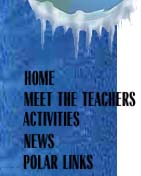
|
Annual Report for Dora Nelson Teacher Info Page | Annual Login Page
Were you in the field this season?
Yes
Dates in the Field:
July 14 - Aug. 29
Approximate Number of Student E-mails:
3
Approximate Number of Teacher E-mails:
15
Apporximate Number of Other E-mails:
25
Approximate Countries Represented:
USA
Additional Comments:
My experience was extraordinary. The only regret that I have is that my school was out of session and I did not get the student parcticipation that I wanted. Although I prepped the students before school ended, they did not interact with me in the field -- many of them were at summer camp, vacationing, etc. The date for the webcast was released after school was out, and even though we published it (and other updates) on our school website the response was minimal at the time. I am positive that I will more interaction during the followup trip -- in fact, it will be required for my AP students! The Lower School students will be parcticipating also. When I returned to school in September, it was clear that they had read my journal entries and had completed the summer readings about the arctic that I had assigned in the spring. My AP Environmental Science class and AP Biology class have continued to use my experience and arctic research in general as part of their course work. Deb Meese anticipated that it would be more problematic to communicate with students during summer trips, even with careful preparation beforehand. I will be returning to Alaska in March/April and I am certain that I will have much more student interaction (they will be, afterall, a captive audience). I am also returning to BASC (Barrow Arctic Science Consortium) as a volunteer this summer (June-Aug. 2004) and I am planning to take 2 or 3 students with me for part of the time.
Did you maintain a daily (or as often as possible) electronic journal while in the field?
Yes
Continued Collaboration with Research Team Members
Type of Interaction / Outcomes / Dates / Locations / Parcticipants:
Email and telephone contact with Aerosonde team -- Dennis Hipperson, David Wright, Brett Solanov, Dennis Fowler -- on-going since September -- updates and plans for the March mission
How are you sharing your research experience with your colleagues, district, community, etc?
Presentations
3rd, 6th, 11th, 12th grades at Carolina Day School
Earth Science Museum in Asheville, NC
Givens Estates Community in Asheville, NC
TEA Collaborative Learning Group
Name:
Dave Fortney
Active?
No
Active?
No
Active?
No
Active?
No
Number of Associates in local network:
3
Presentations and Real Audio Sessions
Presentation Date, Title, Number of Attendees, Etc.
Webcast -- July 27 2003 -- attended by 3 students and several teachers and administrators
Have you presented to your local board of education this year?
N/A
Has this activity been submitted to the TEA Web Site?
No
Has this activity been submitted to the TEA Web Site?
No
Has this activity been submitted to the TEA Web Site?
No
Have you submitted all press-related materials concerning your TEA experience to the TEA Archives?
No
Have you submitted 20 digital images to the TEA Archive with electronic captions?
No
Have you submitted 6-8 photos to the TEA Archive?
No
Number of Release Days Covered by School/District for TEA Program/Activities:
0 days in 2003
Reasons for Release:
so far, all activity has been out of school
Approximate Daily Rate of Substitute and Number of Substitute Days:
0 days in 2003
TEA Meetings Covered by School/District/Corporation
Permanent Materials and Equipment Provided by Institution/Corporation/District for the TEA Program
Other Shared Costs
follow-up trip in March/April 2004
presentations: NCAIS (NC Association of Independent Schools) Conference -- Fall 2004
|
